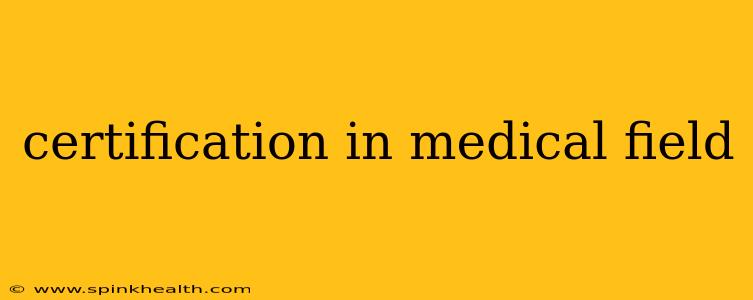Navigating the Maze: Your Guide to Medical Field Certifications
The medical field is a vast and dynamic landscape, brimming with opportunities for those driven by a passion for healing and helping others. But with so many specializations and career paths, knowing where to begin can feel overwhelming. One crucial step in solidifying your professional identity and enhancing your career prospects is obtaining the right certifications. This journey isn't just about ticking boxes; it's about building a strong foundation of expertise, increasing your credibility, and opening doors to exciting new possibilities.
Let's embark on this exploration together, unraveling the intricacies of medical field certifications. This isn't a simple list; it's a narrative, guiding you through the key considerations and helping you chart your course to success.
What types of medical certifications are available?
The range of medical certifications is incredibly broad, reflecting the diverse specialties within the healthcare sector. Think of it as a branching tree, starting with a core trunk and extending to numerous specialized branches. We can broadly categorize them as follows:
-
Professional Certifications: These are typically granted by professional organizations and demonstrate competency in a specific area of practice. Examples include Registered Nurse (RN), Certified Medical Assistant (CMA), and Certified Occupational Therapy Assistant (COTA). These are often required for licensure or employment in certain roles.
-
Specialized Certifications: Once you've established a foundation, you might pursue specialized certifications within your chosen field. A cardiovascular nurse, for instance, might seek certification in cardiac rhythm interpretation or advanced cardiac life support (ACLS). These demonstrate advanced skills and expertise.
-
Board Certifications: For physicians and other advanced practitioners, board certifications represent a significant milestone. These are awarded by specialty boards after rigorous examinations and often signify the highest level of competency in a specific medical field.
How do I choose the right certification for my career goals?
Choosing the right certification is a crucial step, akin to selecting the right path on a winding road. Consider these questions:
-
What are your career aspirations? Do you want to specialize in a particular area? Do you envision yourself in a leadership role? Your career goals should heavily influence your certification choices.
-
What are the requirements for your desired job or role? Many healthcare positions require specific certifications as a prerequisite for employment or licensure. Research the job descriptions thoroughly.
-
What are the educational and experience prerequisites? Some certifications demand specific educational backgrounds or years of experience before you can even apply.
What are the benefits of getting a medical certification?
Securing a medical certification is more than just adding a line to your resume; it's a significant investment in your professional growth. The advantages are manifold:
-
Increased Earning Potential: Certified professionals often command higher salaries and have better negotiation power.
-
Enhanced Credibility and Professional Recognition: Certifications demonstrate competence and commitment to excellence, building trust with patients and colleagues.
-
Improved Job Prospects: In a competitive job market, certifications act as a powerful differentiator, making your application stand out.
-
Career Advancement Opportunities: Certifications can open doors to more senior roles and leadership positions.
How much does it cost to get a medical certification?
The cost of medical certifications varies significantly depending on the type of certification, the organization offering it, and the required exam fees. Some may involve modest fees while others can run into hundreds or even thousands of dollars. Be sure to budget accordingly.
How long does it take to get certified in the medical field?
The timeframe for obtaining medical certifications differs based on the specific credential and the individual's preparation. Some certifications require completing a program of study, while others focus primarily on exam preparation. It's vital to check the timelines provided by the certification body.
What are some of the most in-demand medical certifications?
The demand for medical certifications fluctuates according to market needs and technological advancements. However, consistently sought-after certifications often include those in nursing (RN, Certified Nurse Midwife), medical assisting (CMA), and various specialized areas like cardiovascular technology and respiratory therapy.
By carefully considering these aspects and researching the various options available, you can confidently navigate the path toward obtaining a medical field certification that aligns with your career aspirations and contributes to your professional success. Remember, this journey is an investment in yourself, setting the stage for a rewarding and impactful career in the healthcare sector.

